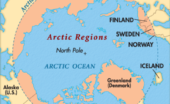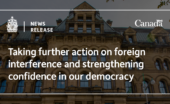Re The UN General Assembly Speaker Schedule is Here! I note that whoever will be speaking for Canada this year…
Wednesday Night #1368
Written by Diana Thebaud Nicholson // May 21, 2008 // Agriculture & Food, Canada, Carbon, Clean energy/renewables, Economy, Environment & Energy, Herb Bercovitz, Oil & gas, Reports, Wednesday Nights // 3 Comments
More on carbon on Wednesday-night.com see also Carbon trading at Montreal Exchange
The interrelated topics of Energy, the Economy, Environment and Food are on the agenda. It seems that there are none of our panoply of topics that one, if not all of these, does not affect directly or indirectly.
Carbon emissions trading (for the uninitiated a good place to start is with CBC’s indepth pages) as Australia registers the first transaction under the national emissions trading scheme and the Montreal Climate Exchange prepares for the May 30 launch date for trading MCeX carbon futures contract.
The Gazprom deal in Québec with Gaz Métro and its partners? Are we happy about this? Should we worry about the ominous statement that Gazprom [is] just an arm of the Kremlin? Coincidentally, it has just been announced that Gazprom enters Nordic carbon trading market.
Ottawa’s scrapping of the two nuclear reactors that were planned to produce medical isotopes.
The world economy, George Soros is far from sanguine saying that the “acute phase” of the credit crunch may be over but effects on the real economy are yet to be felt, and warning the “financial bubble” of the last 25 years could be drawing to an end and the post World War II “super-boom” era could also be over.
We were recently introduced to John Mauldin’s blog and e-newsletters. The recent “Food for Thought“ touches on a number of points raised during Wednesday Night discussions. “What countries are truly the have and have nots of the world? … Food and energy resources may be at least part of the definition in the future … agricultural needs are going to be a new and important force in the world and when coupled with energy may shift the balance of power in the world in strange a different ways.”
Food prices are rising — everywhere. In the developing nations, many face starvation, the World Food Program budget is exhausted and there’s no end in sight. Meanwhile, in the developed world (and that means Canada too), there is concern that proper nutrition is sure to take a hit, with a higher incidence of obesity-related diseases such as diabetes being reported. Yes, energy costs are a cause, but cultivation of bio-fuel crops and natural disasters are also taking their toll.
World Hunger, a continuing concern, exacerbated by the two horrific natural disasters in Burma/Myanmar and China. The latter seemingly dealt with efficiently and humanely by the government and with a surprising civil society participation (The public outpouring is so overwhelming that analysts are debating whether it will create political aftershocks and place pressure on China’s authoritarian state to allow more space for civil society. NYT), while the former continues to be a pathetic example of a merciless dictatorship clinging to power at the cost of the lives of the population. But possibly a glimmer of hope emanating from the ASEAN nations?
U.S. politics:
We may/may not have developments in the Democrats’ race for the nomination, following Tuesday’s primaries in Oregon and Kentucky.
We cannot let the Bush administration’s designation of Polar bears as Endangered Species go unremarked. Although not intended to be perceived as action on climate change, we venture that it has contributed to a huge wave of hot air on both sides of the border.
Back to Québec. Apparently no-one told the Bouchard-Taylor commission that reports should be released on Wednesday so we will have to discuss Reasonable Accommodation on the basis of the Gazette’s purloined alleged copy of the final draft and the expected virulent reactions from Mme Marois and M. Ducepe.
Returning to the economy, the latest twist in the saga of the ABCP Investors poses such a legal conundrum that Mr. Justice Colin Campbell has put his decision on hold.
The Report
New School of Athens
Think tanks have attracted bright, creative people from around the world to produce novel approaches to world problems, but many (most?) have not succeeded in transforming those ideas into viable action. From its think tank origins, the Club of Athens has crossed the threshold to evolve into the School of Athens on global issues. Funding is believed available to establish a permanent structure in the form of a neoclassic building in Athens as the centre for a worldwide school based on the Library of Alexandria, making use of Platonic ideals and Socratic methods.
The economy – banks, sub-prime loans, financial disaster?
The London Interbank Offered Rate (LIBOR) is the daily rate at which wholesale interbank loans are offered on the London wholesale money market. In North America, however, the distrust between banks has evolved to the point that interbank loans have become virtually non-existent. Some sub-prime loans are still out; many have been written off and many more will have to be written off. In his just-published book, “The New Paradigm for Financial Markets: The Credit Crisis of 2008 and What It Means” and numerous media interviews, George Soros maintains that the world is facing financial disaster; however, one wise observer points out that his book must have been written at least six months ago and the successful author is not likely to change his tune while the book is selling briskly. An informed Wednesday Nighter suggests that “it’s the eye of the hurricane” and while there are still significant risks outstanding, we are in a better position to handle it.
Oil and energy
As food and energy prices rise exponentially the fear of stagflation somewhere along the line becomes very real. The U.S. may well suffer a real estate meltdown followed by another wave of inflation and protectionism. President Bush’s recent discussion with the Saudis produced a mere token increase in petroleum production, possibly because the availability of petroleum from the traditional Mid East fields has already peaked, as was forecast by banker Matt Simmons in his 2005 book “Twilight in the Desert“. Although there have been encouraging announcements from Brazil, undersea oil is very difficult to access, hence expensive. Whether or not the prediction of the inevitable depletion of global petroleum sources comes within half a century from now, oil reserves are indisputably finite and the era of cheap oil is already over. [The Economist, as usual, has a pertinent article this week: Double, oil and trouble]
During the last oil crisis, the highway speed limit was reduced to fifty-five miles an hour, following which, automobile manufacturers made automobiles lighter, hence less safe. An obvious partial solution to the current problem would be electric vehicles for which the infrastructure does not, unfortunately, exist. More pertinent is the lack of any pressure or incentive from either government or citizens for the development of electric or efficient hybrid models. BMW has succeeded in producing some models that are extremely fuel efficient but has not succeeded in promoting them, perhaps due to the luxury image promoted by BMW.
There is no doubt as to the severity of the crisis in the future, but at the moment the supply is ample but controlled by the international cartel and the interdependence of producers and suppliers. This is currently a financial rather than a supply problem.
It is easy to target the big oil companies and their obscene profits, but the alternative of nationalizing oil – or other energy – companies would have disastrous effects on the country, including absence of the incentives for technology development that come from competition. Furthermore, the importance of shares in oil companies to pension funds and other investors’ portfolios must not be underestimated.
As China becomes more affluent, the use of petroleum products in that country continues to rise exponentially, exacerbating the world problem.
Carbon Futures Trading
On Friday the 30th, the Montreal Climate Exchange , a joint venture of the Montreal Exchange and the Chicago Climate Exchange will begin trading in carbon futures emissions contracts. The event will attract federal and provincial dignitaries including Premier Charest, Minister of Environment John Baird and Minister of Foreign Affairs Maxime Bernier [Not since the news of his resignation on May 26th!]
The partnership between the Montreal and Chicago exchanges is significant in that it will enable the MCE to expands its international footprint in the future to take advantage of global opportunities such as the carbon credits available from Eastern Europe and Russia.
Canada’s intensity-based regime does not present optimal conditions for the carbon market. However, at the request mostly of the industrials that are looking for a price-discovery mechanism, along with significant political interest, the market will be launched based on compliance credits to be delivered at a point in the future. The first contract will expire in June 2011. Each contract represents 100 tons of CO2.
This is an interesting concept that has the capacity to effect carbon emission reductions although not systematically.
The only way to effectively reduce emissions is with a cap-and-trade (putting a strict limit on greenhouse gas emissions by the ‘big polluters’. Those polluters would pay – and/or invest in a (verified/audited and accredited) project that reduces energy/carbon footprints – if they exceed the cap, and the revenues would be directed by the government to climate-friendly initiatives), which aims at the more methodical reduction of total emissions, with slowly diminishing cap combined with carbon credit trades. The key to success in this initiative is the close monitoring of carbon emissions in order to cap them at the current level, and to verify claims of reduction. The Liberals are now promoting a ‘mix-match’ of cap-and-trade combined with carbon tax, a policy that a number of Wednesday Nighters believe to be unduly punishing for end users. Liberals however say that the carbon tax will be revenue neutral .
The system of carbon credits creates incentives for industries to become more energy efficient. A company that can demonstrate a reduction in its carbon footprint may receive a certificate that can be traded with companies that have not succeeded in doing so. In itself, the result is neutral but it does have advantages.
– It reduces operating cost of the company that has succeeded in reducing its carbon emissions.
– It increases costs for companies that have not succeeded in reducing emissions and induces them to avoid further cost by becoming more efficient.
– The total carbon emission is reduced by the lag time in trading and by the purchase of carbon emission futures either to be retired by individuals or organizations seeking to improve the environment or by individuals for the purpose of holding them in the expectation of reselling them at a higher price.
The carbon credit/tax is complex and its effectiveness has yet to be established – One can have a very bad policy based on the best of intentions. In the final analysis climate change is a global problem and a global solution must be found. The Kyoto accord was an excellent idea but is not effective i.e. China (which has just surpassed the U.S. as the world’s largest emitter) , India and most of Africa are increasing emissions significantly, but having no cap, are exporting credits to European utilities. Thus, global energy consumption will continue to rise until and unless there is a global cap.
While the carbon emissions market is geared to an exchange between big polluters and projects or industries that have reduced carbon output, there is another side of the equation represented by voluntary markets – purchases by individuals or organizations of offsets for personal carbon footprints (ex: carbon fund.org ). It is possible for such entities to simply purchase their own carbon credits, thus forcing the market price for the major polluters higher.
Viable and easy alternatives (notably, nuclear) to carbon-based energy exist today and as the cost of oil rises, those solutions will become more evident and acceptable.




3 Comments on "Wednesday Night #1368"
Amidst all the critical outcries, we were somewhat surprised by the Gazette editorial stance on the Liberals’ carbon tax proposal:
Dion’s carbon-tax proposal shows courage, good sense
Liberal leader Stéphane Dion has spoken up in favour of a revenue-neutral carbon tax. This is the best thing he has done in months.
It’s easy to forget, in the current fog of disdain for Dion, that he excelled in his two cabinet portfolios, first as the minister against Quebec sovereignty and then as environment minister. And here’s an environmental policy which makes sense. If he sticks with this concept, and if he gets the details right, Dion has a chance here to challenge Canadians to live up to their best image of themselves. Are we just energy hogs or are we prepared to make an effort to do better?
But we can count on the National Post to oppose, as usual suggesting that there is no moral fibre in the Canadian voter.
A carbon tax that won’t fly
Stephane Dion is again musing about a carbon tax. During his bid for the Liberal leadership in 2006, he called it “bad policy.” Then, last spring, he suggested a carbon tax was a good policy, but not so good that the Liberals should adopt it. Now, Mr. Dion appears to be saying that a carbon tax may be the right policy for the Liberals after all. His most recent flip flop could not come at a better time for the Conservatives. With high gas prices already enraging consumers, Mr. Dion’s idea will be suicidal at the polls.
The carbon experiment Terence Corcoran in The National Post
In any discussion of carbon taxes, no matter what their form, it is important to keep the core economic theory in focus. The basic idea, advanced by early 20th-century economist Arthur C. Pigou, is that if a society wants to reduce the use of something that’s undesirable, the best way to do that is to have the government tax it. Pigou is the magician behind the great global pressure from economists and politicians … for taxes on carbon emissions.
The theory is simple enough, and intuitively appealing. In the Pigouvian world, if you raise the price of carbon, the laws of supply and demand will kick in and carbon use–from burning coal, oil, gas, wood– will fall. As carbon use falls, the threat of man-made global warming will be reduced, maybe even eliminated. Beautifully simple. Who could not like such a clean solution to a messy problem?
Unfortunately, little of what Pigou said on the subject of Pigouvian taxes is of any use to policy makers. How high should the tax be? How do you set targets for measuring effectiveness? What do you do about the side effects of the taxes? What do you do with the tax revenue?